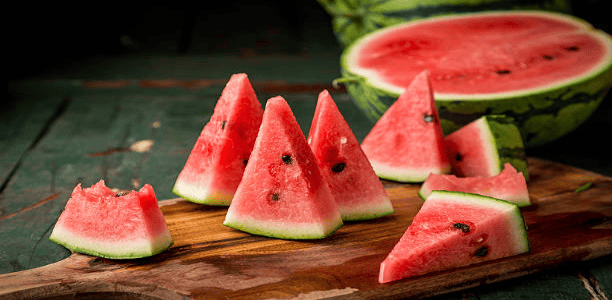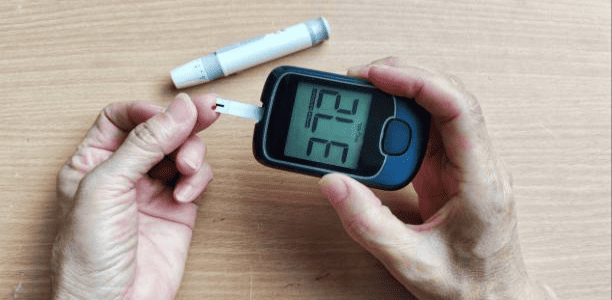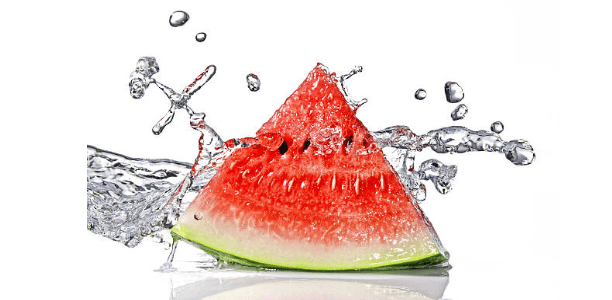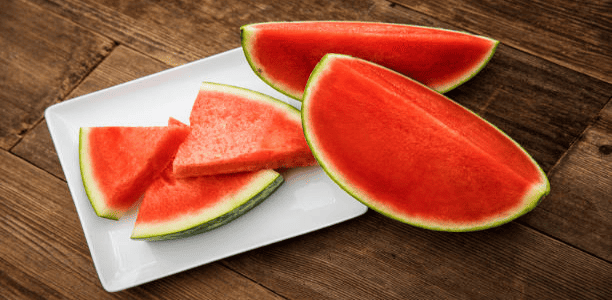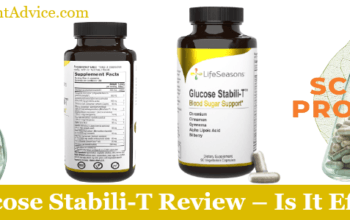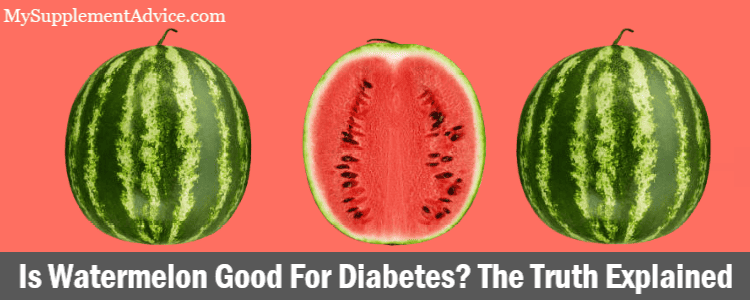
Is Watermelon good for diabetes?
This juicy and refreshing fruit is popular for several reasons…
But is it suitable and helpful for blood sugar control?
Well – if you want to know about its effects, this article answers all of your questions.
Let's get to know if it's worth trying watermelon for your high blood sugar.
Note: This article includes references and studies on watermelon and diabetes.
Is Watermelon Good For Diabetes? (In A Nutshell)
To start off, watermelon is a popular refreshment and source of hydration.
That especially if you have diabetes, prediabetes or you just want to lower the risk:
- most of its content is water (estimated at around 92%)
- a serving has a GI of 5, which won't cause a spike in the blood sugar levels
- has a higher level of lycopene (even than tomatoes)
- provides antioxidants, vitamins, minerals and phytochemicals
However, that's pretty much it. Watermelon doesn't improve diabetes dramatically.
As you can see, watermelon is a decent alternative to water – if you're craving other drinks.
But let's focus more on watermelon's key compound, lycopene.
So how can it help you manage diabetes?
- reduces blood glucose levels and insulin resistance
- decreases oxidative stress that worsened diabetes
However – don't expect that watermelon will help you stop your other treatments.
That's because it can't prevent diabetes, simply because it doesn't have a cure.
Sure – it has several benefits for the body, but that's it.
It's not a miraculous remedy for diabetes – it's not even an actual remedy for this condition.
That's because as potent as other herbs, or as the top blood sugar supplements.
Overall, watermelon is a healthy component of a balanced diet, but that's all.
What Is Watermelon?

- comes from the family called Cucurbitaceae
- was native to Africa before being introduced to Asia, Europe and America
- its scientific name is Citrullus lanatus
- a lot of people eat it fresh because of its sweet and slightly sour taste
As we all know – watermelon is a popular snack.
This happens a lot in summertime, since it's good for hydration (92% water) [2].
But it also comes with some potential benefits [3]:
- lowers cardiovascular diseases
- improves age-related ailments
- reduces obesity
- has anti-cancer properties
Additionally – it can help alleviate the other factors causing diabetes.
So if that's your particular goal, let's talk about the connection between the two below.
Watermelon & Diabetes
In this chapter, let's further look into the relationship between the two:
- what is diabetes and its symptoms
- top benefits of watermelon on diabetes
1. Diabetes
Firstly – it's essential to understand diabetes itself [4]:
- caused by an insufficient insulin production or your body's inability to utilize it well
- the most common sign is elevated blood sugar
- there are three main types of diabetes – type 1, type 2 and gestational diabetes
- genetics, obesity, insulin resistance and hormonal imbalances are some risk factors [5]
Just so you know, diabetes is a long-lasting condition and unfortunately, it doesn't have a cure.
So the best thing you can do is to prevent it or keep it under control.
2. Diabetes' Top Symptoms
Again – there are different kinds of diabetes but type 2 is the most common one (about 90-95% of cases).
With that, let's focus on its main symptoms [6]:
- frequent peeing (especially during the night)
- lethargy and very low energy
- feeling thirsty more than usual
- losing weight without effort
- blurry vision
- wound takes time to heal
- itchiness and thrush
Now – you're more likely to develop type 2 diabetes if you are obese or have a sedentary lifestyle.
These issues can increase the risk of insulin resistance, which is a main trigger.
In addition – you should also be aware of the prediabetes stage.
It only means that your blood sugar levels are higher than normal.
But the level is still too low to be considered type 2 diabetes.
Instead, it shows that you're at risk of diabetes, stroke and heart disease [7].
Well – the good thing is, you can still prevent, delay or reverse prediabetes with some changes:
- weight loss
- active lifestyle
- healthy meal plan
- taking a diabetes/blood sugar supplement
But just so you know, this health condition is individualized.
What works for others might not be the best treatment for you.
3. Watermelon's Potential
Now – let's see if a watermelon is helpful for diabetes:
- typically, a whole fruit has a glycemic index (GI) of 80 and a serving is around 5 only [8]
- it's mostly made of water [9]
- contains some fiber that can contribute to digestion improvement
- makes a good source of lycopene, phytochemicals, antioxidants and other nutrients
Now – watermelon's GI looks very high at first.
But keep in mind that you're not consuming the whole fruit, so it's a lot lower.
You're left with a GI of around 5, which won't increase your blood sugar levels.
In addition, water is recommended to people with diabetes instead of any other drink.
That's simply because it has no calories or carbohydrates.
But as humans, we tend to look for other types of refreshments.
The good thing is, fresh watermelon is a guilt-free alternative for hydration.
Now – we will highlight how the watermelon's lycopene content can mitigate diabetes-related issues [10]:
- can reduce blood glucose levels
- promotes higher insulin levels in type 2 diabetes
- decreases the transformation of oxidized cholesterol in diabetic state
Also – its antioxidant and anti-inflammatory properties can lower the complications of diabetes.
Additionally, it contains 40% more lycopene content than tomatoes.
Overall – watermelon has some potential contributions to diabetes management.
However, it still has very limited studies regarding its full efficacy (compared to Ceylon cinnamon, for example).
But if you're just looking for a fruit that won't raise your blood sugar, watermelon is a good option.
Just don't look at it a sole treatment or as a cure, because it's not.
Conclusion
To sum it up, limited studies suggest that watermelon can reduce blood sugar levels.
Also – it has the ability to improve insulin sensitivity.
That's because of its lycopene content and other essential nutrients.
But keep in mind that it's not a remedy for all the issues connected to diabetes.
Side Effects
Honestly – watermelon is far from being a danger to health.
But just like any fruit/vegetable, you should eat it in moderation. If not – here are the possible repercussions:
- frequent urination
- spike in blood sugar levels
- constipation or indigestion
- bloating or diarrhea
- stomach cramps
- headache or vomiting
- allergy or rashes
Now – recurring urination is caused by its high water content.
Meanwhile, the rest of the issues are pretty common adverse reactions that rarely occur.
Additionally – you might be wondering if it could be dangerous to blood sugar because to its sweet taste.
The answer to that is No.
Keep in mind that eating sugar, fruit and honey won't give you diabetes.
But even if it doesn't directly cause it, the overconsumption of sugar can increase the risks.
The same goes for watermelon consumption, you just need to watch your intake.
Overall – you can avoid all of the side effects above by being responsible with what you eat.
How To Take Watermelon Correctly
You can still enjoy watermelon if you have diabetes, prediabetes or just want to limit the risk.
Here are some tips you should keep in mind:
- Always choose fresh watermelon and stay away from processed ones.
- Limit your serving size to one cup daily.
- Pair it with other healthy foods, for a balanced diet.
- Monitor your blood sugar levels every once in a while (especially if you're at risk for diabetes).
- Try to have an active physical lifestyle.
Now – it's up to you to choose the eating schedule.
Watermelon is a fruit, so that's not actually a big deal.
You can consume it at breakfast, lunch, dinner or snack time.
But just remember to look after the portion size, in order to minimize the potential risks.
Also – it's highly discouraged to buy artificial or processed watermelons.
But overall, watermelon is indeed a healthier alternative to foods high in sugar/sweeteners.
Final Conclusion
Overall – watermelon is rich in lycopene, which can reduce the risks of getting of diabetes.
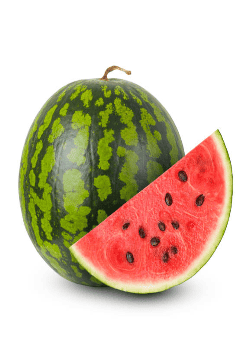
- improves insulin sensitivity
- decreases blood sugar levels
- reduces oxidative damage that leads to diabetes
Also – the amount of lycopene in watermelon is higher than that in tomato (around 40%).
That's why watermelon could be a good addition to your diet.
You really don't have to worry about it causing diabetes, due to its minimal sugar content.
But again, too much of it or any sweet fruit can increase the risk.
So the best answer is to eat it in moderation.
Lastly – watermelon's potential to improve diabetes is surely there.
However, don't rely solely on it as a treatment, since it's far from a cure/solution.
Instead, just consider it as part of your health and wellness journey.
References:
1 – https://plants.ces.ncsu.edu/-plants/-citrullus-lanatus/
2 – https://www.ncbi.nlm.nih.gov/-pmc/articles/-PMC4464475/
3 – https://www.ncbi.nlm.nih.gov/-pmc/articles/-PMC7698065/
4 – https://www.cdc.gov/-diabetes/basics/-diabetes/
5 – https://www.niddk.nih.gov/-health-information/diabetes/-symptoms-causes/
6 – https://www.nhs.uk/conditions/type-2-diabetes/-symptoms/
7 – https://www.niddk.nih.gov/-health-information/diabetes/-what-is-diabetes/
8 – https://www.health.harvard.edu/-diseases-and-conditions/-glycemic-index/
9 – https://www.diabetes.co.uk/-food/-water-and-diabetes/
10 – https://www.sciencedirect.com/-science/article/-S0753332218317256/

